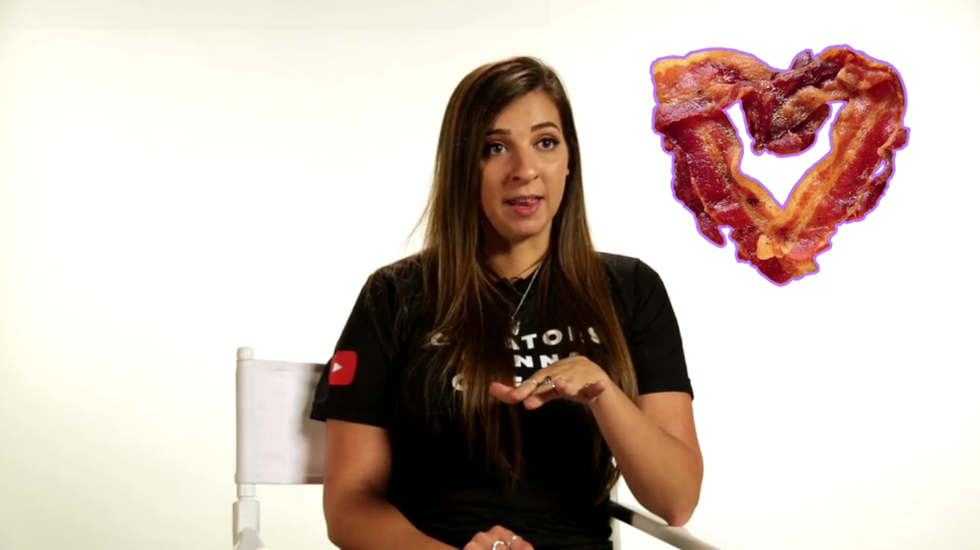Orthorexia Nervosa
In 1997 Dr. Steven Bratman coined the term orthorexia nervosa; or the unhealthy obsession with eating only healthy or "pure" foods. Although not yet recognized by the DSM, (Diagnostic and Statistical Manual of Mental Disorders), orthorexia nervosa is extremely, extremely real.
One of the first people to come out into the public and admit to suffering from orthorexia nervosa is Jordan Younger, a lifestyle blogger from California. Younger was a raw vegan who was dedicated to her online blog, The Blonde Vegan. The more she told her story of veganism and how it nearly saved her life, the more followers she would gain. She began accepting endorsements from vegan cleanse companies, and thus cleansing upwards of three times a week. At this point she started to realize and give attention to this unhealthy fixation on controlling her diet. She admitted to her followers that she was suffering and seeking treatment for her illness. People from different walks of life began to identify with this term, orthorexia nervosa. They finally understood and had a name for this OCD like illness.
"I tried to hide my food fears when I was with other people — and veganism was the perfect cover. Rather than admit my food phobia, I could just claim it was too hard to eat out as a vegan. Meanwhile, the cycle continued: I cleansed, got too hungry, broke down and ate solid food, felt terribly guilty, and rededicated myself to another cleanse — usually a longer one."
Anorexics restrict to lose weight, orthorexics restrict for many reasons such as lowering blood sugar, to decrease the chance of heart disease, or to live a longer life.
Orthorexia may begin as an innocent goal to live a more healthy lifestyle, but it can quickly take a turn for the worst, controlling the lives of those it casts its shadow on. The motivation and intention to stay healthy while usually for good, can be taken too far at times. Orthorexia nervosa, like anorexia nervosa is an illness focusing on restriction, not binging or purging. Anorexia however is usually focused around restricting food entirely, in order to lose weight. Anorexics while sometimes restricting because they think it is "healthy," they are typically doing so to be "skinny." Orthorexics are different in that they might restrict calories, or even entire food groups. Anorexics restrict to lose weight, orthorexics restrict for many reasons such as lowering blood sugar, to decrease the chance of heart disease, or to live a longer life. You can see why this doesn't seem like much of a problem at first. Orthorexics can come in many different forms, including those that are on juice only fasts, gluten free (when not suffering from Celiacs or gluten intolerance), refined sugar free, carbohydrate free, etc. If a person is restricting an entire food group against the recommendation from a medical doctor or registered dietitian, it is typically not the best idea.
A Lonely Illness
Orthorexia can also be characterized by people who restrict where and when they can eat. For example, if a friend cannot go to half priced appetizers because there is nothing there that they are "allowed" to eat. Or if they go, they might not eat at all. One of the main signs of orthorexia is the isolation. Many orthorexics find themselves isolated from their friends and family, because these people may not support their lifestyle. Orthorexics typically revolve their day, and even their life, around food. Throwing off this schedule or interfering with it could totally throw their day, and so often times orthorexics are very strict with their diet and schedule.
The Anxiety
Orthorexia is essentially an illness of anxiety; anxiety surrounded by the food they eat and how it is prepared. Something so simple as going to a wedding, or a birthday party, may cause the sufferer a lot of extreme anxiety. Wondering what they can eat when they're out with their friends, or having to bring their own food to a work meeting, can take a large toll on their mental health. Planning and preparing their meals may take a lot of their time and energy, and a shift in this can cause a lot of stress.
An All Consuming Illness;
Orthorexia Nervosa consumes the lives of those that suffer. Their entire life revolves around food; grocery shopping, comparing labels, calorie counting, preparing food, and planning meals. There is often not enough time for other normal activities such as socialization, work, etc. Their life is their diet.
What This Health Kick is Really Doing to Your Body
Each orthorexic is different, restricting different food groups and with different habits. Many orthorexics are unaware of the possible harmful effects this disease can have on their body. Avoiding entire food groups in the diet can be extremely dangerous if not done so properly. Those who cut out fruit for an example due to the high sugar content can be deficient in multiple vitamins and antioxidants. Each orthorexic diet has it's own risks along with it. Another risk factor that many don't think of is the mental toll it can have on the body. Stressing about food at all hours of the day is not healthy, to the point where it entirely consumes their life.
A Social Media Illness
With the increase in popularity of social media, comes an increase in precedence of orthorexia nervosa. The obsession with posting healthy, beautiful pictures of food on Instagram and receiving hundreds of likes. The glorification of "clean" eating through the media, is causing an increase in this epidemic, and allowing it reach an even younger audience. If you search the hashtag #EatClean on Instagram there are more than 25 million posts alone, some from personal accounts but most from internet bloggers and and health addicts alike. Some of these accounts that post strictly clean eating recipes and pictures of healthy meals have millions of followers, that strive to do just so- "follow."
Our generation has become obsessed with the glorification of healthy eating, exercise, and self control. We have bred individuals that believe that eating pure and exercising often is "moral" or "right." It gets to the point where this is peoples lives. These bloggers and social media celebrities are being paid and endorsed to market products, wear clothes, and take pictures of it. Bloggers can be paid to blog, just like people can be paid to post an Instagram picture. The value of eating healthy to be healthy is declining, while eating healthy to post a picture and get 10,000 "likes" on it increases. While we may all be guilty of posting our delicious salad on our social media, this cannot be our only purpose in life. At what point does #EatClean become an eating disorder? Our obsession with social media while unhealthy and very related to orthorexia, is another story in itself.
The problem is that people look up to these bloggers and social media extraordinaires. They are idols, they are inspiration. Their self control is impeccable. Their culinary skills are amazing, and their photography skills to take a picture of their protein pancakes in dim lighting at 6 a.m. and make it look that good, is unfathomable. One can only wish that they had the time to prepare such healthy meals every day, take a picture and post it to social media, and also ENJOY the food, all while looking like a #FitChick. Do you ever sit down and think that this is their life? Let me say it again. This is their life. You are not paid to cook flawless meals and post them on Instagram, they are. You may not have the time or resources to make these meals. Hell, maybe you don't even like kale.
To read more about the truth behind some internet celebrities, check out the story about Australian teenager Essena O'Neill who has quit Instagram claiming that it doesn't represent "real life."
While maybe not every fitness blogger or "clean" eater is suffering from orthorexia nervosa, many are. By following these pages, liking their pictures, and obsessing over their "perfection", you are encouraging this mental illness. You may not even be realizing it, but you are applauding eating disorders. Nothing, not even your diet should be so all encompassing, that it fully controls your life.
Pics or it Didn't Happen
If you cook a really awesome, beautiful meal and you want to take a picture and post it because you are extremely proud of yourself, or just to remind all those guys that you are #single and #domesticated (and that they should probably jump in line), go for it! But if you are creating these meals and posting them just because you get some satisfaction out of making others look at you in a specific way, then that is a problem. If you feel you need to prove to your followers that you do indeed care about your health, and that you are so strict with your eating that they should be jealous of your self control and #CleanEating, then you're doing it for all the wrong reasons.
While eating healthy and exercising to improve your health is usually a good thing, to do so in such an extreme way that you "fall of the wagon" and beat yourself up about it, that's when it becomes detrimental to your mental health.
Eat clean because you want to eat clean, not because it's a trending hashtag. And at birthday parties, anniversaries, and special occasions, eat dirty. And hashtag that, too. Because you're human, and humans aren't perfect, so why should your diet be?
Getting Help
There a few tell tale signs of orthorexia nervosa, such as isolation, obsession around food, anxiety, and the drive to have a "perfect" diet. If you or someone you know is unable to socialize or live a normal, healthy life, without the interference of their diet, orthorexia may be the reason. While not a medical diagnosis yet, treatment is still out there.
To find out more about how you can get help visit National Eating Disorders Association.
Think nothing tastes as good as skinny feels? Think again.
Watch webisode "Let's Be Honest" and hear about the fine line between living your life and being happy, and staying healthy.






















